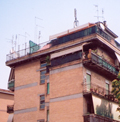
 On 7 April 2009 the coordinator of WP6 organized an intermediate meeting at the university of Bologna. During this meeting each partner presented the country case study through a power point and discussed methodological issues and future lines of investigation.
On 7 April 2009 the coordinator of WP6 organized an intermediate meeting at the university of Bologna. During this meeting each partner presented the country case study through a power point and discussed methodological issues and future lines of investigation.
The Italian team explained that they have been studing the relationship between female migrants and religion in the neighbourhood of Centocelle in Rome. Collocated in East periphery, Centocelle, with a surface of 208,16 ha and 55.000 inhabitants, is one of the neighborhoods in which the presence of immigrants is more relevant in the town. The italian research focuses on groups of women of different ages who habitually attend the mosque and the baptist church. Aim of this study is analyzing the religious practices in the everyday life.
The Bulgarian team showed that they focus on the dynamics of gender and religion among recently arrived immigrant Muslim groups. Their target group comprises immigrants from the Middle East, Central Asia and Africa with different status (refugees, temporary residents, citizens).
The Greek team illustrated that they focus on studying the relationship between religion, gender and intercultural interactions among Albanian and Bulgarian migrants. The case study is located in Athens and examines religious practices of Albanian and Bulgarian migrants who identify, or have in the past identified, themselves as Christian Orthodox, Muslim, or Catholic believers. The study analyses the religious practices in the everyday migrant lives and trajectories, as well as the varying attitudes towards Greek Orthodox Christianity, the officially recognized ‘dominant religion of the Greek state’.
The Turkish team explained that they were going to start fieldwork on migrant women from ex-Soviet countries, and Central and Eastern Europe such as Moldova, Ukraine, Belarussia, Romania, Bulgaria and Russia, who actually live in Istanbul and identify themselves as Orthodox Christians and various levels of religiosity. The goal of the research is to find out how these migrant women relate to their religiosity, practice their religion and interact in their Churches in a dominantly Muslim country and culture such as the one in Turkey. Moreover, the research team questions how orthodox Christian culture coexists with a Muslim culture, what kind of transformations are observed in religious identifications during the migration process vis-a-vis their gender roles.
In order to better coordinate the different case studies (Italy, Bulgaria, Greece, Turkey), all the partners agreed to take the following steps:
1. Focusing on daily religious practices.
2. Addressing the question of publi-pricate space.
3. Challenging the exceptionality of Islam.
4. Use gender as analytical category.
5. Organizing an intermediate meeting in Sofia on October 2009.
The workshop report is available in PDF or XML format

